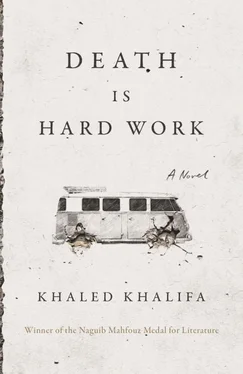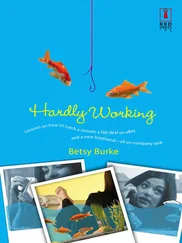The next agent to open the door asked for one of the relatives of the corpse in the minibus to please step forward. Hussein ignored him, still absorbed in a long conversation about car tires with the three young men who had been on their way to Sweden. His animated features communicated his deep satisfaction as a torrent of aphorisms flowed from his tongue with an eloquence wholly unsuited to this environment. Bolbol was forced to get up when the soldier beckoned him to follow.
He was brought to an officer who couldn’t have been more than thirty. All of the family’s documents were in his hands: their identity cards and the death certificate signed in accordance with the proper regulations. The officer asked Bolbol for details of every single family member and friend of his father. He said he would transfer them to the main facility for questioning and detain the body, likewise in accordance with the proper regulations. Though the officer’s cool tone left little hope, Bolbol pleaded with him to be allowed to continue with their journey, adding that he himself supported the current regime—he and his father had been estranged!—and going on to say that he had lived in the suburb of M, where a mix of religions was found, for more than twenty years. Bolbol heaped curses on his father for the benefit of the officer, who once again turned over the papers in his hands and looked at them contemptuously. The short silence that followed these pleas allowed Bolbol to hope that the officer wasn’t serious about handing the family over to the Mukhabarat… but he didn’t know how he could plead for mercy for his father’s body.
The officer explained that according to their records, Bolbol’s father was still alive and still wanted. It didn’t matter if he had in the meantime turned into a cadaver. Then he added that his commanding officer would settle the matter in the end and asked Bolbol to go through to the other room to fill in and sign this and that form. Bolbol was dripping with sweat. They really were going to take the body. Yet another agent went into the holding cell and took the minibus keys from Hussein. He drove it to a nearby garage and locked it, notifying the guard that it wasn’t to be taken off the premises without the express permission of the officer in charge.
This same agent came back and led Bolbol into the next room and said that it wasn’t the first time this had happened. Another corpse had been arrested the previous month and sent under armed escort to Tishreen Military Hospital, where a committee had had to look into the matter and sign off on the body’s status. The corpse wasn’t surrendered to its family until all the appropriate procedures had been followed, which the agent then took it upon himself to explain at length. First, they entailed going to the civil-records office and updating the deceased’s status, then going to the central registry and issuing a cable that would suspend the outstanding warrant. The body would be kept in custody until being transferred to the military hospital for examination, where the death of the wanted man would be confirmed and the legal procedures to permanently cancel the search warrant completed. The agent couldn’t seem to make up his mind from one sentence to the next as to whether the state regarded a person as being merely a collection of documents or rather an entity of flesh, blood, and soul. Bolbol nodded desperately and asked the agent to go into more detail, but eventually he stopped talking and ordered his prisoner to go ahead and fill out the form.
Bolbol felt the pressure of the silent agent’s observation as he wrote in the required details about his family members and the members of their extended families and then surrendered the form. Gathering his courage, he offered a bribe to the agent who had explained the procedures to him, referring to it demurely as a “goods-transit document.” The agent gave him a sardonic glance, but they agreed on twenty thousand liras—if the body was released. The agent took Bolbol back to the holding cell and wished him luck, saying that he hoped the commanding officer would settle the matter swiftly, and adding that they would keep the family at the checkpoint till the arrival of the cable that would determine their fate.
Time passed slowly; the prisoners were all ensnared in their various conversations, which Bolbol resolved to ignore. He was thinking of the labyrinth they would be lost in if the Mukhabarat really decided to transfer the body to the military hospital. His fear increased every time he thought of the possibility that a person might be nothing more than a collection of papers. He heard the old woman describing the destruction of Homs to Fatima, adding that she had been arrested three times since the revolution—she pronounced the word openly and without fear—but that this was the first time she’d ever been held as a hostage. Bolbol wasn’t surprised at the old woman’s mettle; she reminded him of his father and his father’s friends, in whose hearts fear had seemingly died forever. But he was surprised at Fatima’s zeal in narrating the tale of her sister-in-law, which she naturally launched into as soon as she was given an opportunity. She asked the old woman if it was true that the secret police raped women being detained, and the woman laughed and murmured, “Men too,” adding that a thousand years would pass before this outrage would be forgotten.
Whenever the door opened, an agent would throw a new prisoner inside. The cell was getting more and more intolerably crowded, but everyone knew that they wouldn’t be there long; they couldn’t be kept there all night, otherwise their jailers would already have separated the men from the women. Bolbol wondered whether there might not be a real prison in the nearby complex, something older and more permanent than this temporary setup, but he halted that train of thought immediately, telling himself that holding cells were one commodity still more than plentiful in his country. The door opened again: a mother and her two children came in. She wasn’t kept waiting long. She sat by the old woman and Fatima and told them that she didn’t know what she was being accused of; she had been on her way to Beirut, where her husband worked in construction, and they had ordered her to get off the bus she had boarded at Deir Azzour. A few minutes later, the woman said that she had six brothers in the Free Army, and now they had been forced to fight alongside a battalion of Islamic extremists in al-Mayadin, since their own funding had been cut off and their supplies had run out. She added that many Free Army troops had defected to the Islamist side because they supposedly had more money. The woman said all this in a loud voice; Bolbol kept a safe distance as he observed her.
Bolbol got up when he saw Hussein had at last run out of steam. He wanted to make the peril of their enforced idleness clear, to explain the labyrinth he had foreseen them all entering, had foreseen overwhelming them, but he changed his mind when he saw that his brother, even half asleep, was still blathering about tires. Bolbol went up to the cell door instead and caught the eye of the agent he’d spoken with earlier, miming that he wanted another word. The agent opened the cell door, and Bolbol reminded him of their agreement; the agent promised that everything would be all right if they raised the sum from twenty to thirty thousand. Bolbol said this was fine, but explained that they weren’t from a well-off family and that this sum was all they had in the world. The agent returned Bolbol to the cell and asked him to stay close to the door.
Bolbol sat next to Hussein and explained everything to him. Hussein was taken aback; he’d secretly been hoping that the body’s being impounded by the police might actually prove the best possible outcome—saving the family from who knew what dangers might still await them on their trip. Bolbol steeled himself to deliver the news that they could of course still be detained as hostages… Hussein scratched his head and found himself let down by his memory once again; no anecdote or saying seemed entirely germane to their situation. He pushed the question to one side and said that if the Mukhabarat had taken the corpse into custody, they would have to dispose of it themselves. They could burn it or sell the organs or throw it into a mass grave—what would the dead person care, after all? Bolbol was astonished. He felt his brother’s burgeoning fear deeply, not to mention Hussein’s ever-present wish to take revenge on their father one way or another. In Bolbol’s opinion, though, contrary to Hussein’s, losing the body to the security forces would plunge the family into a mire from which they’d never be able to extricate themselves—a trap in which details would get so tangled they would never figure out what had happened to them. Hussein agreed to leave Bolbol to sort everything out, and although Bolbol felt entirely impotent, he was less afraid at this moment than at any other time in his life.
Читать дальше












